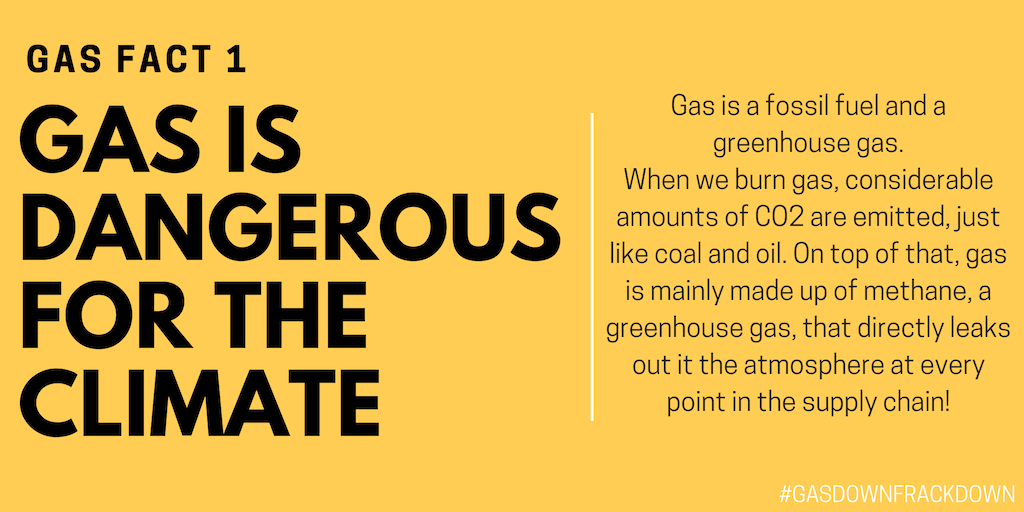When is gas not a gas? When it threatens our health and all we hold dear and need to simply live and thrive.
The COP24 climate talks in Poland are focusing on greenhouse gas emissions and fossil fuels and they still don’t get how bad gas is.
Food & Water Europe has been working to stop fracking and gas infrastructure for years. Together with the Gastivsts, we are getting out the truth out about gas and the dangers it and the industry pose. We hope you will spread the word, too.

Gas is dangerous for the climate
Gas is a fossil fuel and a potent greenhouse gas. When we burn gas, considerable amounts of CO2 are emitted, just like coal and oil. On top of that, gas fuels climate change by emitting methane, a greenhouse gas that directly leaks out in the atmosphere at every point in the supply chain!
Gas and the Paris Agreement? Incompatible
Gas is a dirty fossil fuel, similarly bad for our climate as coal. We do not have time for wrong solutions or alleged “bridge fuels” that do not reduce our emissions. Gas will slow down the energy transformation that we need.
Gas is a social justice issue
Our consumption of fossil gas prolongs the unjust fossil fuel model and cements a neocolonial, neoliberal and capitalistic system. From Azerbaijan to Algeria, local people must bear the burden and risks of fossil gas extraction, but do not reap any benefits. A few elites and companies profit from the gas, which only leads to growing inequality.
Gas will not benefit workers
The gas and fracking industry often creates much less local and full time jobs than expected. Employment in the field is often temporary and high skill jobs are filled with foreign experts. Gas will lock us into an unjust and unsustainable fossil fuel system – we need to democratise our energy system and improve workers rights.
CAUTION : Gas can damage your health
Fracking in particular can have serious impacts on affected communities health: respiratory diseases, rashes, nosebleeds, reduced birth weight, impacts on mental health and illnesses linked to often carcinogenic fracking chemicals. Communities must bear these risks, while the fossil fuel industry makes a profit.
No room for gas in our energy transition
The fossil fuel industry tells us to replace coal by gas. But the energy transition we fight for is a transition towards a democratic energy system where local communities decide and manage their own clean energy. Gas is not clean and will still be managed by multinational corporations, it is a false solution!
Gas is coal’s best friend
The anti-coal movement has been leading a fierce fight from the Philippines to Germany! As they win, the fossil fuel companies think they can replace coal by gas to keep their business going as usual. But we will directly lead a transition to clean energy and to community-owned energy systems!
Gas companies do not respect human rights
The companies extracting gas and building gas infrastructure, such as Bonatti, Shell, TransCanada and ExxonMobil, are involved in human right violations, corruption cases, indigenous right abuses. We will not let them remain unaccountable.
Gas activists are criminalised and threatened
From the UK to Mexico, from Argentina to Italy, local people that are fighting the imposition of gas projects are being increasingly criminalised and threatened. As they try and exercise their right to their land or to protest, they are being framed as an enemy of the state and face increasing repression. We stand in solidarity with all of them.
Gas extraction causes earthquakes
Gas extraction has been proved to create earthquakes damaging people’s home, physical safety and mental health. In the Netherlands, over 100,000 homes have been damaged by the extraction of gas in Groningen. People are not able to sell their house and move, they must remain in unsafe homes.


